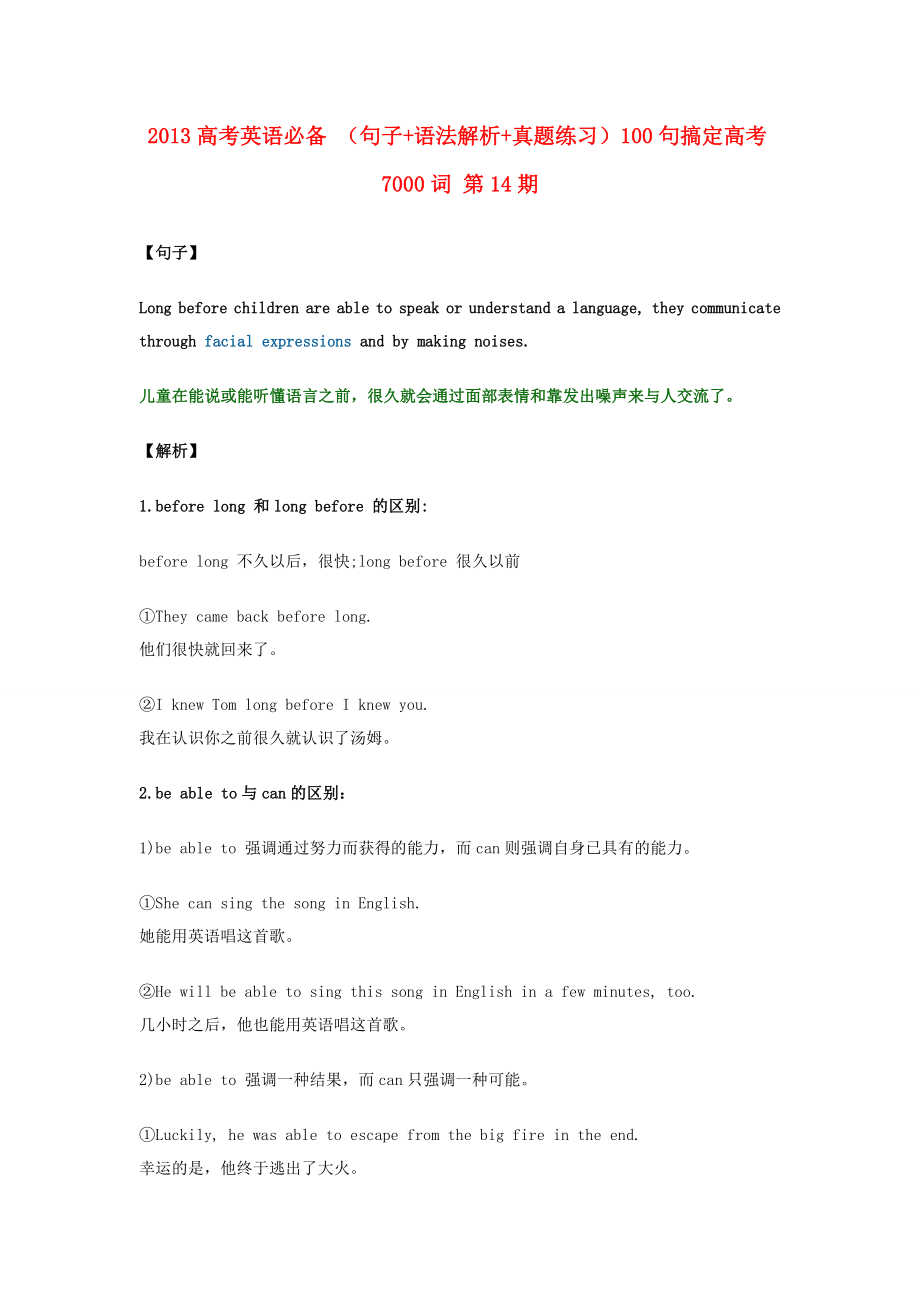《2013高考英語必備 (句子+語法解析+真題練習(xí))100句搞定高考7000詞 第14期》由會員分享,可在線閱讀�����,更多相關(guān)《2013高考英語必備 (句子+語法解析+真題練習(xí))100句搞定高考7000詞 第14期(3頁珍藏版)》請在裝配圖網(wǎng)上搜索����。
1、2013高考英語必備 (句子+語法解析+真題練習(xí))100句搞定高考7000詞 第14期
【句子】
Long before children are able to speak or understand a language, they communicate through facial expressions and by making noises.
兒童在能說或能聽懂語言之前�����,很久就會通過面部表情和靠發(fā)出噪聲來與人交流了�����。
【解析】
1.before long 和long before 的區(qū)別:
before long 不久以后,很快;long before 很久以前
2�、①They came back before long.
他們很快就回來了。
②I knew Tom long before I knew you.
我在認(rèn)識你之前很久就認(rèn)識了湯姆��。
2.be able to與can的區(qū)別:
1)be able to 強(qiáng)調(diào)通過努力而獲得的能力�,而can則強(qiáng)調(diào)自身已具有的能力。
①She can sing the song in English.
她能用英語唱這首歌�。
②He will be able to sing this song in English in a few minutes, too.
幾小時之后,他也能用英語唱這首歌��。
2
3�、)be able to 強(qiáng)調(diào)一種結(jié)果,而can只強(qiáng)調(diào)一種可能����。
①Luckily, he was able to escape from the big fire in the end.
幸運(yùn)的是,他終于逃出了大火�。
②If he got here a few hours earlier, I could save him.
要是他早幾小時來,我還能救他�。
3)be able to 可以有各種時態(tài);而can只有一般現(xiàn)在和一般過去兩種時態(tài)�����。
①He is / was / will be able to help you.
他能幫你的忙�����。
②I could help you las
4、t night, but you didn’t come.
昨天晚上我能幫你��,而你又沒來��。
4) can可用于表示可能性�����,推測����,允許等情況�,而be able to通常不這樣用。
①You are able to use my pen. (誤)
②You can use my pen. (正)
5)can有被動語態(tài)����,主語為人或物皆可,而be able to只接不定式的主動形式�,不接表示被動的不定式,也不可用無生命的名詞作主語���。
①The work is able to be done by him. (誤)
②He is able to do the work.(正)
注意:指過
5�、去某時或某個時刻設(shè)法做成某事,不用could,而用was\were able to�����。
I talked with her for a long time,and eventually I was able to make her believe me.
我談了很久����,最終還是使她相信了我的話。
3.facial n.面部護(hù)理���;美容 a.面部的
①She is having a facial massage.
她正做臉部按摩��。
②I've made an appointment for a facial next week.
我已經(jīng)預(yù)約了下周去美容�。
4.expression n.
6����、 表情,表示��,表達(dá)���,詞句��,措辭�,表現(xiàn)
【近義詞】
face n.表面,臉;v.面對,面向????????? look v.看,尋找;n.看,樣子
manifestation n.表現(xiàn),示威運(yùn)動??? saying n. 諺語,俗話;動詞
communication n.交流,通訊??????? appearance n.出現(xiàn),露面
countenance n.面容,面部表情;v.贊.. phrase n.短語,習(xí)語;vt.措詞...
idiom n.成語,慣用語????????????????? term n.學(xué)期,術(shù)語;vt.把 ...
①He had a passive expression on his face.
他臉上有一種漠然的表情。
②The scenery was beautiful beyond expression.
那風(fēng)景美麗得無法形容���。
【練習(xí)】
The fire spread through the hotel very quickly but everyone ______ get out. A had to? B would? C could? D was able to
 2013高考英語必備 (句子+語法解析+真題練習(xí))100句搞定高考7000詞 第14期
2013高考英語必備 (句子+語法解析+真題練習(xí))100句搞定高考7000詞 第14期

